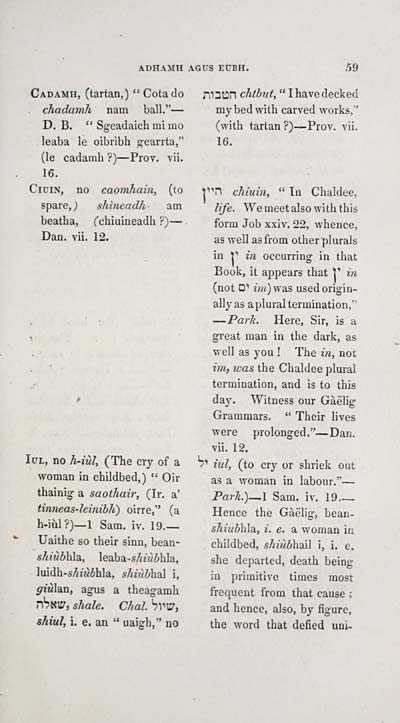Download files
Complete book:
Individual page:
Thumbnail gallery: Grid view | List view

ADHAMH AGL'S ECBH.
.59
Cadamh, (tartan,) " Cotado
chadamh nam ball." —
D. B. " Sgeadaich mi mo
leaba le oibribh gearrta,"
(le cadamh ?) — Prov. vii.
16.
CiciN, no caomhain, (to
spare,) shìneadh am
beatha, (chiuineadh ?) —
Dan. vii. 12.
luL, no h'iùl, (The cry of a
woman in childbed,) " Oir
thainig a saothair, (Ir. a'
tinneas-leinibh) oirre," (a
h-iùl?)— 1 Sam. iv. 19.—
Uaithe so their sinn, bean-
shiùb\\\di, \e&hà.shiùb\-\\di,
luidh-s/^mèhla, s/aùihal i,
giù\dia, agus a theagamh
rhm, shale. Chal hvVy
shiul, i. e. an " uaigh," no
ri"i30n chtbitt, " Ihavcdecked
mybedwith carved works,"
(with tartan?) — Prov. vii.
16.
ì'^n chiuin, " In Chaldee,
life. We meet also with this
form Job xxiv. 22, whence,
as well asfrom other plurais
in V in occurring in that
Book, it appears that V in
(not D' irn) was used origin-
allyas apluraltermination,"
— Parh. Here, Sir, is a
great man in the dark, as
well as you ! The in, not
im, was the Chaldee plural
termination, and is to this
day. Witness our Gàèlig
Grammars. " Their lives
were prolonged." — Dan.
vii. 12.
7' iul, (to cry or shrlek out
as a woman in labour." —
Park.)~l Sam. iv. 19
Hence the Gàèlig, bean-
shiub\i\dL, i. e. a woman in
childbed, shiùbh'à\\ i, i. e.
she dcparted, death being
in primitive times most
frequent from that cause ;
and hence, also, by figurc,
the word that defied uni-
.59
Cadamh, (tartan,) " Cotado
chadamh nam ball." —
D. B. " Sgeadaich mi mo
leaba le oibribh gearrta,"
(le cadamh ?) — Prov. vii.
16.
CiciN, no caomhain, (to
spare,) shìneadh am
beatha, (chiuineadh ?) —
Dan. vii. 12.
luL, no h'iùl, (The cry of a
woman in childbed,) " Oir
thainig a saothair, (Ir. a'
tinneas-leinibh) oirre," (a
h-iùl?)— 1 Sam. iv. 19.—
Uaithe so their sinn, bean-
shiùb\\\di, \e&hà.shiùb\-\\di,
luidh-s/^mèhla, s/aùihal i,
giù\dia, agus a theagamh
rhm, shale. Chal hvVy
shiul, i. e. an " uaigh," no
ri"i30n chtbitt, " Ihavcdecked
mybedwith carved works,"
(with tartan?) — Prov. vii.
16.
ì'^n chiuin, " In Chaldee,
life. We meet also with this
form Job xxiv. 22, whence,
as well asfrom other plurais
in V in occurring in that
Book, it appears that V in
(not D' irn) was used origin-
allyas apluraltermination,"
— Parh. Here, Sir, is a
great man in the dark, as
well as you ! The in, not
im, was the Chaldee plural
termination, and is to this
day. Witness our Gàèlig
Grammars. " Their lives
were prolonged." — Dan.
vii. 12.
7' iul, (to cry or shrlek out
as a woman in labour." —
Park.)~l Sam. iv. 19
Hence the Gàèlig, bean-
shiub\i\dL, i. e. a woman in
childbed, shiùbh'à\\ i, i. e.
she dcparted, death being
in primitive times most
frequent from that cause ;
and hence, also, by figurc,
the word that defied uni-
Set display mode to: Large image | Transcription
Images and transcriptions on this page, including medium image downloads, may be used under the Creative Commons Attribution 4.0 International Licence unless otherwise stated. ![]()
| Early Gaelic Book Collections > Hew Morrison Collection > Adhamh agus Eubh, no Craobh Sheanachais nan Gàël > (77) |
|---|
| Permanent URL | https://digital.nls.uk/76897889 |
|---|
| Description | A selection of items from a collection of 320 volumes and 30 pamphlets of literary and religious works in Scottish Gaelic. From the personal library of Hew Morrison, the first City Librarian of Edinburgh. |
|---|
| Description | Selected items from five 'Special and Named Printed Collections'. Includes books in Gaelic and other Celtic languages, works about the Gaels, their languages, literature, culture and history. |
|---|

